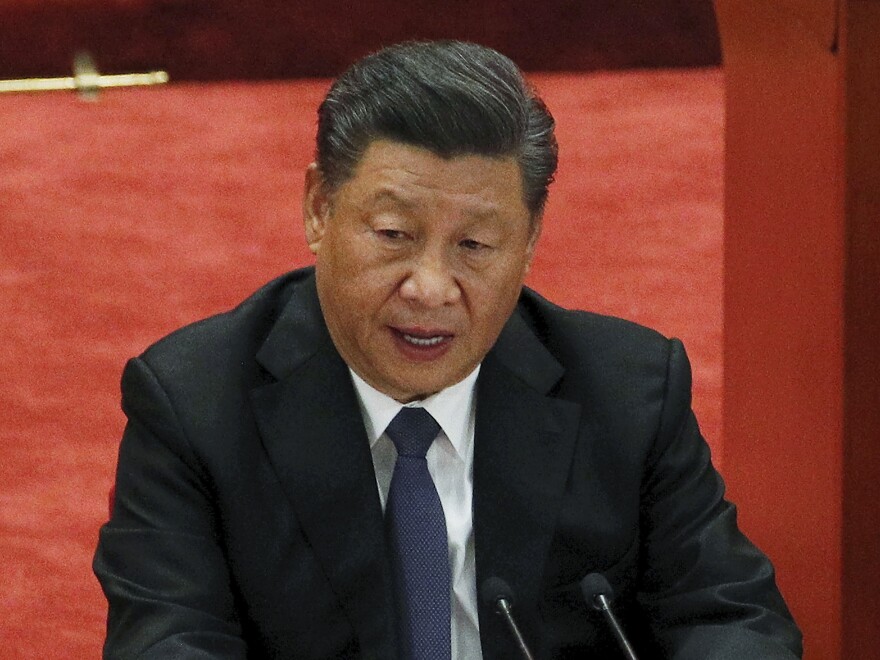President Biden's climate envoy, John Kerry, and his Chinese counterpart, Xie Zhenhua, agreed last week that China and the United States, the world's two biggest emitters of greenhouse gases, should cooperate on tackling the climate crisis.
But with bilateral ties at their worst in decades, and few details emerging from their meeting in Shanghai, observers have been left to guess what that cooperation might look like.
Meanwhile, competition with China is coming into focus as a key piece of the Biden administration's response to climate change. Some analysts say that might be a good thing.
Angel Hsu — an assistant professor at the University of North Carolina-Chapel Hill who studies public policy, the climate and China — was initially taken aback by the prominent mention of the need to meet "the ambitions of an autocratic China" in Biden's $2 trillion infrastructure plan, unveiled last month.
"But then I thought, if it actually leads to productive competition and lights a fire under Americans to actually try to compete with China on clean energy, then it might not be necessarily a bad thing," she says.
"We need the U.S. to, frankly, feel like they're behind and losing this clean energy race," Hsu says, "because they are."

The script on climate has flipped in recent years.
During the Obama administration, the U.S. helped drive policy action, including with China. The two governments launched a climate dialogue, and interaction between local governments, universities and companies grew.
In 2014, President Barack Obama and Chinese leader Xi Jinping jointly announced ambitious targets for cutting greenhouse gases, setting an example and paving the way for the Paris Climate Agreement a year later, says Joanna Lewis, a China climate expert at Georgetown University.
"But, yeah, I think we're in a different situation now," she says.
Former President Donald Trump effectively sidelined the U.S. from the climate discussion — reversing dozens of environmental regulations, calling climate change a hoax and withdrawing the United States from the Paris accord.
He also adopted a much more confrontational approach to Beijing, one that the Biden team has not jettisoned — and one that analysts say has made cooperation between the two countries harder across the board.
In contrast, Beijing has poured money into green industries, incentivized policy makers to pay more attention to the environment and pursued targets for reducing the country's reliance on fossil fuels. In September, Xi said China would reach carbon neutrality by 2060.

In a speech on Monday, Secretary of State Antony Blinken made note of China's dominance in certain green industries, like solar panels, wind turbines, batteries and electric vehicles.
"If we don't catch up, America will miss the chance to shape the world's climate future in a way that reflects our interests and values, and we'll lose out on countless jobs for the American people," he warned.
Li Shuo, a senior policy adviser at Greenpeace in Beijing, says it's hard for Beijing not to be skeptical about the U.S. commitment to the climate, at least on the diplomatic front.
"In a way, the U.S. is playing catch-up, and in their eyes, Chinese eyes, they've been kind of holding the fort. So it is politically unfair, from their perspective, that the U.S. now comes back and is asking others to do more," he says.
Complicating matters, Kerry has said he wants to ring-fence climate issues from the many points of friction in the relationship, while Beijing sees climate as inseparable from the bigger picture of deteriorating bilateral relations. Some suspect that may help explain why China left it unclear until Wednesday whether or not Xi would attend a virtual climate summit to be hosted by Biden on Thursday. (He will.)
Competition between China and the U.S. in green sectors appears poised to heat up — and according to Hsu, could create a "race to the top."
Blinken said there are dozens of categories of clean energy in which "no one has staked a dominant claim."
"And, with a lift from our domestic and foreign policy, every one of them can be American-led and American-made," he said.
Beyond technology and industry, there's also an opportunity to compete with China in financing green projects around the world, says Edward Cunningham, director of China programs at Harvard University's Ash Center for Democratic Governance and Innovation.
"Particularly the developing world could benefit greatly by some form of increased guided competition on sustainable infrastructure," he says.
And the timing could be right for the U.S. as well, he says, because China's lending for infrastructure around the world declined in recent years.
"When you peel the onion back and you talk a lot about competition, whether it's clean tech competition or whether it's competition in infrastructure," he says, "I think there are some aspects that can be positive if it's managed well."
Copyright 2021 NPR. To see more, visit https://www.npr.org. 9(MDAxNzg0MDExMDEyMTYyMjc1MDE3NGVmMw004))








